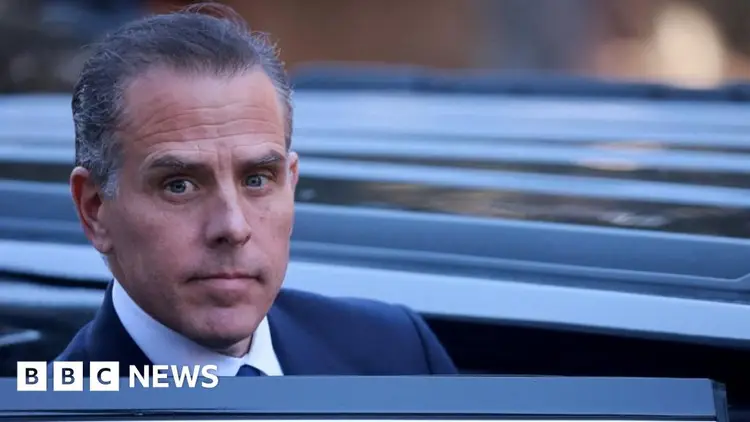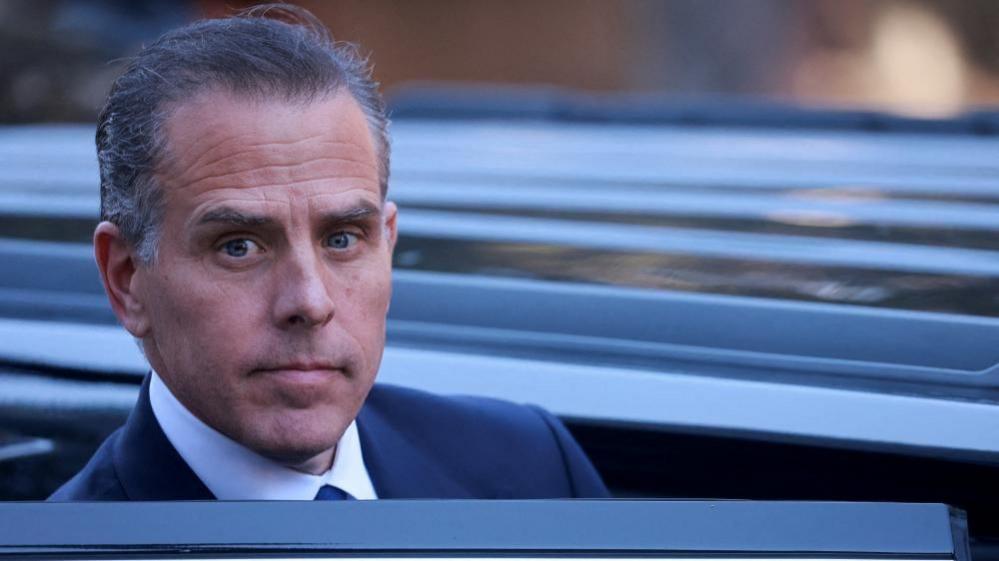What did Hunter Biden do and what is a presidential pardon?

President Joe Biden of the United States has granted a presidential pardon to his son Hunter, who was facing punishment in relation to two criminal cases.

The decision has sparked debate, as the former president had dismissed the idea before. However, he claimed that the charges against his son were driven by political motives.
His exercise of pardon authority follows a long-standing practice among presidents from both major political parties who have historically given clemency to individuals within their inner circle.
What Were Hunter Biden's Actions?
Hunter Biden is scheduled to be sentenced later this month in two federal cases.
In June, he made history as the first child of an active US president to face criminal conviction, stemming from issues regarding his possession of a firearm. A jury in Delaware found him guilty on three counts for providing false information about his drug use on a form during the purchase of a handgun.
He was also waiting for his sentencing after admitting guilt in a federal tax case in September. This case focused on whether he had paid adequate taxes between 2016 and 2019. The nine charges against him included not filing and paying his taxes, evading taxes, and submitting a false tax return.
According to experts speaking with the New York Times, he was looking at a maximum of 25 years in prison for the gun charges and 17 years for the tax charges. However, they suggested that he would probably receive significantly lighter sentences and could serve them at the same time.
Understanding Presidential Pardons
The US Constitution states that the president has the authority to give pardons and reprieves for crimes against the United States, with the exception of cases involving impeachment.
In this situation, the president's "complete and absolute pardon" applies to any possible federal offenses that the younger Biden might have engaged in over a span of more than a decade, starting from January 2014 and lasting until December 2024.
The language of the pardon clearly indicates that it applies to any crime that the younger Biden "has committed or might have committed." This could shield him from legal examination regarding his international business activities, particularly in Ukraine, which is a significant topic for the incoming President Donald Trump and his backers.
A pardon is a form of legal forgiveness that eliminates any remaining penalties and restores rights, including the ability to vote or hold public office.
While the authority to grant pardons is seen as extensive, it does have its boundaries. For instance, a president is only able to pardon offenses that fall under federal jurisdiction (crimes at the national level).
This topic is important because there's uncertainty regarding the sentencing of Trump in his hush-money case in New York. If he returns to the White House next January, he won't be able to grant himself a pardon for this case at the state level.
Watch: From accusation to forgiveness - what led us to this point?
How Many Pardons Have Past Presidents Given?
There is a well-established tradition of U.S. presidents from both major political parties granting pardons, sometimes even to individuals in their inner circle. This marks the 26th pardon that President Biden, a Democrat, has issued.
In 2020, former President Trump, a member of the Republican Party, granted clemency to Charles Kushner, who is the father of his daughter Ivanka. Kushner had been sentenced to two years in prison back in 2004 for several offenses, including tax evasion, violations related to campaign financing, and interference with witnesses.
In 2001, Bill Clinton granted clemency to his younger half-brother, Roger Clinton, who had a cocaine conviction from 1985.
In both instances, the individuals who received pardons had already completed their sentences. Meanwhile, President Biden's involvement in his son's situation occurs before the sentencing phase.
During his four years as President, Trump issued a total of 237 acts of clemency, as reported by the Pew Research Center. This included 143 pardons and 94 reduced sentences. A significant number of these actions took place in a rush just before he finished his term.
That figure is much lower than the 1,927 clemency actions taken by Barack Obama during his eight years in office, according to Pew. Of these actions, 1,715 were commutations and 212 were pardons.
One of the most debated presidential pardons was given by Gerald Ford to former President Richard Nixon in 1974, addressing actions related to the Watergate Scandal. This move was seen as a way to help the country recover.
Biden And Trump's Views On Pardons
The day after Biden assumed the presidency in 2021, he made it clear that his approach would contrast sharply with Trump's. His press secretary informed the press that the numerous last-minute pardons granted by Trump were "not an example... of how President Biden intends to exercise his own authority. He plans to utilize his power in a much more careful manner."
Following his son's conviction, Biden stated that he would not grant a pardon. In a statement explaining his change of heart, he noted that he had promised to "allow the justice department to make its own decisions." However, he argued that his son had been "targeted" and experienced a "failure of justice."
Trump is one of the critics who have targeted Biden over this decision, labeling it an "abuse."
The new president inquired if Biden would consider granting pardons to those charged in connection with the January 6, 2021, insurrection, during which supporters of Trump stormed the Capitol in a bid to disrupt the certification of the 2020 election outcome.
While not in the White House, Trump encountered multiple legal challenges and has consistently claimed that the American justice system has been turned against him and his backers.
He has vowed to provide pardons for individuals involved in the riots in Washington. However, it's still unclear who will actually receive clemency and if those convicted of the most serious and violent crimes will also be included.



























































